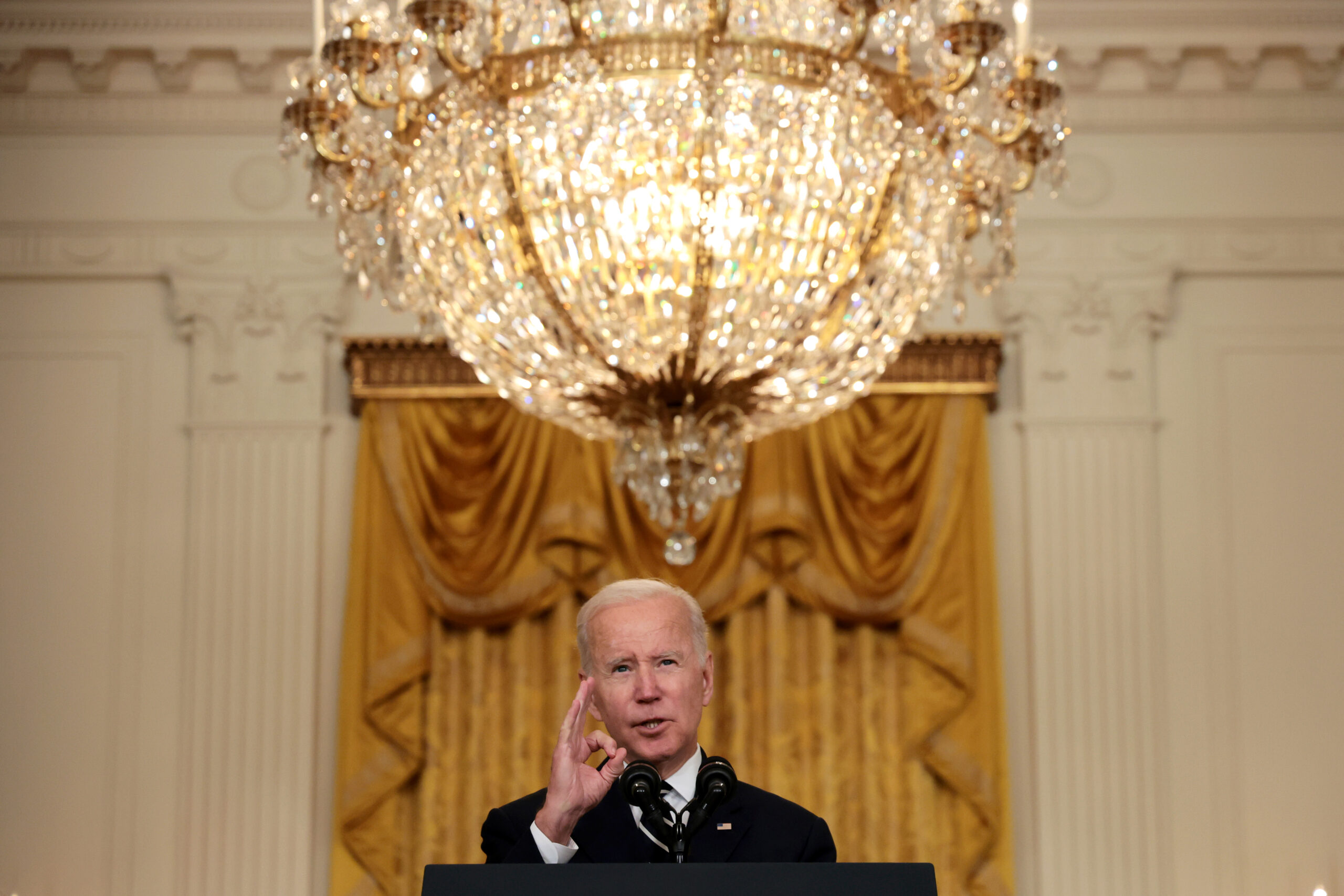President Joe Biden promised voters a “zero dollars” social spending plan, paid for through revenue raisers outlined by the White House. But Democrats’ claims of a cost-neutral bill face new skepticism as details of the package emerge.
After weeks of whittling down the president’s sweeping agenda, the White House unveiled a framework for a roughly $2 trillion agreement on Thursday, with a preliminary estimate of payment mechanisms that claim to raise about $2 trillion over a decade.
But “this is not an official score,” said John Ricco, associate director of policy analysis for the Penn Wharton Budget Model. “The ultimate arbiter of this will be the Joint Committee on Taxation and the Congressional Budget Office.”
An estimate by the Penn Wharton Budget Model puts the total pay-for at $1.5 trillion, or about 25% less.
The White House’s projection is hazy, said Mike Palicz, the Americans for Tax Reform’s federal affairs manager.
“What they’re trying to get at is the idea that this is paid for — it’s not going to add to the deficit,” Palicz said. But to get there, “they’re trying to do some really fuzzy math.”
For Democrats, a significant challenge has been searching for ways to offset the spending, including peeling off provisions and surfacing new ways to pay for the remaining ones.
The proposal released Thursday will target wealthy people and corporations. Still, it won’t hit billionaires with a plan to tax unrealized capital gains, which analysts said would almost certainly face challenges in court.
And while the plan outlined spending for IRS enforcement, omitted from the text was language outlining a tax reporting threshold for any financial transaction over $600. Democrats had sought to protect the measure, which would require banks to provide more information about customers’ accounts to the federal government.
Previewing the measure’s fate earlier in the week, West Virginia Sen. Joe Manchin, a Democrat, called the rule “screwed up” during remarks at the Economic Club of Washington, D.C., and said he had told Biden that he opposed it.
“Do you understand how messed up that is?” Manchin said he told Biden. “This cannot happen. It’s screwed up.”
He added, “I think that one’s going to be gone.”
But without it, analysts said the White House’s estimate of the offsets would likely fall short.
“The big question for us is the IRS funding piece that is listed as [raising] $400 billion over 10 years in their table,” Ricco said, adding that a bank reporting component would “dramatically” increase the provision’s revenue.
“If that’s out of the picture, then there’s really no way that they can get to $400 billion,” Ricco said.
The Penn Wharton Budget Model estimated Thursday that the revenue raisers could reach $1,527 billion, or some $468 billion less than the White House’s estimate.
Biden’s plan faces additional obstacles because it eliminates many of the programs backed by Democrats on the far Left, including free community college, paid family leave, and higher corporate tax rates.
Progressives had vowed to block Biden’s bipartisan infrastructure bill without an acceptable deal on the social spending package. Some members remained opposed to a rapid infrastructure vote even after the social spending framework’s release on Thursday.
“This is business as usual in Washington, isn’t it?” New York Rep. Alexandria Ocasio-Cortez said on Thursday. “Defend the rich and scrap from the poor. What we’re trying to do is figure out if we can generate the political will to protect working-class people as much as people want to protect billionaires.”
And when Missouri Rep. Cori Bush was asked whether the text Democrats had released sufficed for her, the Democrat
told
Punchbowl News, “Not at all.”
Democrats need every vote to pass a bill in the evenly divided Senate. In the House, with Republicans unified against the bill, Democrats can afford to lose just three.
Public polling shows voters dissatisfied, too, albeit for different reasons.
Kristopher Bennefield
told
the Associated Press that he was tired of Democrats “being so indecisive among themselves.” He said he blamed Biden because “if he can’t get his own party to do anything, how can he really do anything else?”
“He has great ideas, but he’s having poor follow-through,” added Bennefield, who identified himself as an independent.
A new
poll
from the Associated Press-NORC Center for Public Affairs Research shows voters unhappy with Biden’s handling of the spending negotiations, with fewer than half voicing support. And despite remarks by the president and his emissaries at stops throughout the country, many voters said they were mainly in the dark about what the package entails.
Forty-one percent of respondents said they disapprove of how the spending negotiations had unfolded under Biden, while 36% said they approve and 23% had no opinion. Democrats have been locked in weeks of fraught negotiations at the White House and Capitol Hill, whittling down the president’s sweeping $3.5 trillion proposal. At the same time, Biden has traveled to Michigan, Pennsylvania, and other states to shore up Democratic support.
The survey shows Biden is also underwater over his handling of the economy, with voters increasingly downtrodden over the country’s direction.
The poll was conducted between Oct. 21-25, based on interviews with 1,083 adults. It has a margin of error of plus or minus 4 percentage points.






